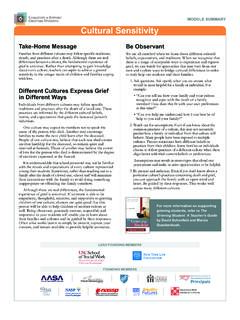Transcription of MODULE SUMMARY Other Reactions
1 MODULE SUMMARY . Other Reactions Take-Home Message Nonverbal Reactions Reactions to death vary greatly in children. Learning how Many children express their feelings in ways Other than children understand and feel about a loss is a useful way to talking. Very young children often work through their determine how to best help them cope. Children's thoughts feelings during play. Older children may use creative activities and feelings can help explain their behaviors both immediately such as writing, role-playing, or art to express their thoughts after a death and after some time has passed. School and feelings. professionals are able to intervene in more appropriate ways While play and creative activities can provide important when actions that might be perceived as misbehaviors are clues to children's thoughts and feelings, adults should be understood in the context of a student's reaction to a death.
2 Careful not to jump to conclusions. For example, children who draw only happy scenes after a traumatic loss might give the impression they are not affected by the events. In A Range of Reactions actuality, they may instead be giving a sign that they are not Other modules in this section address the learning yet ready to process or express their grief. challenges children often experience after a death, as well Rather than interpreting children's play or creative work, as the guilt and shame commonly seen in grieving students. consider asking them to describe what their work is about or (See Impact on Learning and Guilt and Shame.)
3 After a what story they are telling. death, students may express a range of Other Reactions as well, including the following. Anger Little or No Reaction Children may express anger after a death and look to assign blame to others. These Reactions may be an attempt to Some students appear to have little or no reaction at all establish control in response to an overwhelming experience. after the death of someone important in their lives. They may actually be making an extraordinary effort to keep Parents and Other family members are often the targets their emotions hidden from others. Often, they do a very of such anger.
4 They are close by. They are also relatively convincing job. Adults in their lives may be unaware of safe because they are likely to be more tolerant of emotional their distress. outbursts. Children may feel anger at their parents for not protecting them from personal tragedy. This does not mean they are not greatly affected by the death. It is important not to rely solely on children's behaviors Children may also direct anger toward the person who to assess how they are doing. Conversations, check-ins, and died. They may feel abandoned, or be angry about negative invitations to ask questions or discuss feelings can be useful consequences and secondary losses that resulted from the for all students.
5 Death. The death of a loved one can also result in anger at God. Children may question even strongly held spiritual beliefs. It is important to normalize feelings of anger and encourage grieving children to express their feelings in non- harmful ways. When children understand that people often feel angry after a death, they are less likely to feel guilty or ashamed of their feelings. Preexisting Challenges Preexisting learning, emotional, or behavioral challenges may resurface or worsen after a death. Normalize such setbacks for grieving children they are common. Help plan extra supports from professionals with the school and community as students learn to cope with their loss.
6 (Continued). Other Reactions Risky Behaviors reality, however, when under significant stress, children often focus more on their personal needs, at least at first. They may Older children and teens may engage in risky behaviors such act more immature, self-centered or demanding, and be less as drinking alcohol or using Other substances, engaging in tolerant of change. risky sexual activity, or participating in violent or delinquent behavior. This often reflects their struggle to master an Once children's needs are met and they are feeling more increase in feelings of personal vulnerability after the death secure, they are likely to feel more capable and able to of someone close to them.
7 Attend to the needs of others. Over time, they will return to developmentally appropriate behavior, including an interest Invite these students to think about possible links between in seeking increased personal independence. the risks they are taking and their feelings about their loss. When the risky behaviors persist, or when they are serious, refer students to appropriate mental health professionals. Acting Younger In the aftermath of a death, children may begin to act more like they did at an earlier age. Children who were comfortable with independence may become sensitive to separation from surviving family members.
8 For example, a kindergarten student who tolerated being left at school may become clingy after a death. Adults often expect children to become more generous and considerate of the needs of others at times of crisis. In For more information on supporting grieving students, refer to The Grieving Student: A Teacher's Guide by David Schonfeld and Marcia Quackenbush. LEAD FOUNDING MEMBERS. FOUNDING MEMBERS.

